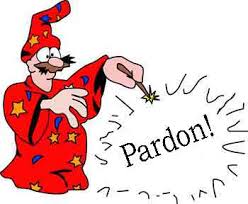pardon
英 [ˈpɑː.dən]
美 [ˈpɑːr.dən]
- n. 原谅;赦免;宽恕
- vt. 原谅;赦免;宽恕
- n. (Pardon)人名;(德、法、捷)帕尔东
使用频率:

记忆方法
将“pardon”想象为请求“παραδόναι”(pardon,在希腊语中意为“pass over”或“forgive”)的行为。可以记忆为“para”表示“旁边”或“超越”,“don”联想到“do over”,即“重新做一次”,暗示原谅是超越错误,给予重新开始的机会。
以上内容由AI生成, 仅供参考和借鉴
中文词源
pardon 请原谅,赦免
par,完全的,词源同per-,完全的,-don,给予,词源同donate.即完全的给予,引申词义赦免,免除惩罚,多用于感叹词”pardon me”,请原谅。
英语词源
- pardon
-
pardon: see date, forgive
- pardon (n.)
- late 13c., "papal indulgence," from Old French pardon, from pardoner "to grant; forgive" (11c., Modern French pardonner), "to grant, forgive," from Vulgar Latin *perdonare "to give wholeheartedly, to remit," from Latin per- "through, thoroughly" (see per) + donare "give, present" (see donation).
Meaning "passing over an offense without punishment" is from c. 1300, also in the strictly ecclesiastical sense; sense of "pardon for a civil or criminal offense; release from penalty or obligation" is from late 14c. earlier in Anglo-French. Weaker sense of "excuse for a minor fault" is attested from 1540s. - pardon (v.)
- mid-15c., "to forgive for offense or sin," from Old French pardoner (see pardon (n.)).
'I grant you pardon,' said Louis XV to Charolais, who, to divert himself, had just killed a man; 'but I also pardon whoever will kill you.' [Marquis de Sade, "Philosophy in the Bedroom"]
Related: Pardoned; pardoning. Pardon my French as exclamation of apology for obscene language is from 1895.
权威例句
- 1. It's enough to make you wet yourself, if you'll pardon the expression.
- 这足以吓得你尿裤子了,请原谅我这么说。
- 2. That, if you'll pardon my saying so, is neither here nor there.
- 恕我直言,那根本就不重要。
- 3. I was impolite and I do beg your pardon.
- 我失礼了,真对不起。
- 4. "Will you let me open it?"— 'Pardon.' — 'Can I open it.'
- “我能打开它吗?”——“请再说一遍?”——“我能打开它吗?”
- 5. I beg your pardon, pray continue.
- 抱歉,请继续。